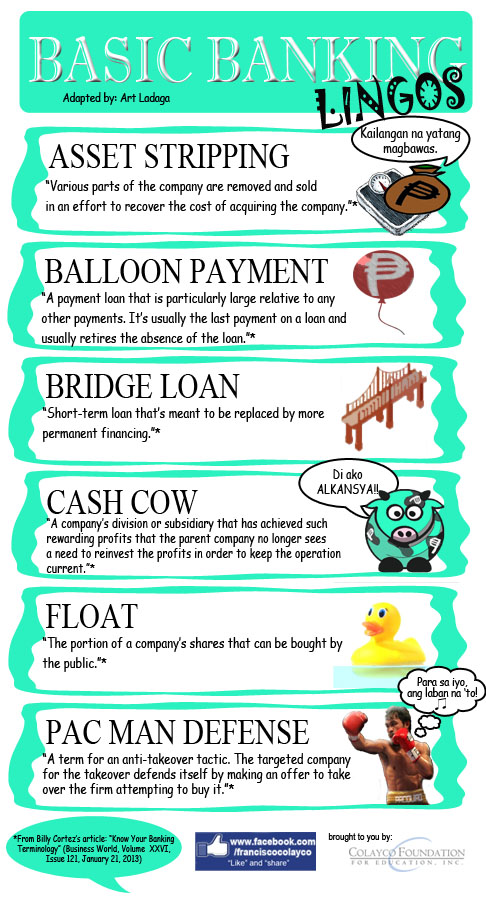by: Francisco J. Colayco
 I received this comment from “Boy Kamote” on a previous blog when I wrote about how we should teach our children about money.
I received this comment from “Boy Kamote” on a previous blog when I wrote about how we should teach our children about money.
“Sir sa mga nasabi o nabangit po ninyo ay sang ayon po ako..sa mga may kaya at panggitnang klasipikasyon na mga magulang ay maari nga nilang ipasunod sa kanilang mga anak… paano nakapagtatabi ang isang tao para sa ibang bagay kung hindi naman sasapat sa isa man lang….yun kalidad na bibilin sa palagay niyo po ba makapamili pa kung alin ang maganda at mura.matibay at may pangalan…paano magiging wise ang isang bata sa pamimili kung hindi niya nga kayang bilhin..o ang dungisin ay papasok sa isang mall nanglilimahid sa dumi at amoy siya bay papasukin hindi diba..alam ko poy kagalang galang at matalino, eh ito po lamang ay isang opinyon sa isang sabihin natin na di naman tayo pantay ng antas ng talino at pamumuhay…paano naman po ang mga magulang na ala man lang pera na maipapakitang ehemplo sa kanilang mga anak….yung mga anak na ala pa sa tamang edad ay naghahanapbuhay na para kumita. Kung ikaw na magulang ng ganun bata ano sasabihin mo pa ba o ipapaaral sa kanila ang mga sinasabi mo…baka sagutin ka ng wag mo akong pakialaman…buti sana kung sobra o sapat ang kinikita pero hindi eh salat na salat pa para sa sikmura…nakalungkot man pong isipin yan ay isang bantad na katotohanan…ano ba ang dapat na isaisip pag ikaw ay may pera para sa isang simple at mahirap na magulang…di ba’t ang mapakain mo ang iyong pamilya ng may lasa lasang pagkain…at pag sila’y nas hapag na ng kainan ang masilayan mo silang masaya habang ninanamnam ang konting biyaya na napagsasaluhan…ano ba ang pakiramdam di ba’t nakapagpagaan ng kalooban di bale ng ala kang naitabi at masasabi mo sa iyong sarili na bahala na bukas at sanay palarin na naman na makahanap ng pera para may maipangtustos sa pang araw-araw…”
Related to this same article is a comment from “Sam” who says: “The best lesson you’ll give your child is about sharing money. Command it, not money commanding you!”
Boy Kamote is right that the advice I give are really for people who are earning some money. This is my chosen advocacy because of my life experiences that I can share. It is what I know best so I choose to share this.
But more than this, my advocacy calls for the elimination of a “mindset of entitlement.” This is the attitude that makes people believe that they have the right to demand “help” from the government, their communities and their churches without having to work for it and thus deserve it. They grow up with the misplaced value that money is given, not earned.
What Sam said is also correct.
However, we can only share what we have. Otherwise, we will not be sharing anything worthwhile.
This is where I come from. We need to teach everyone about the need to earn, save, make your savings grow, and share the savings they have grown with others.
I teach that as long as we are earning some regular income, we can save.
The savings may be minimal but if we have the discipline and determination, we can aspire for greater savings over time.
After all, we have so many examples of people who rose from almost nothing into very successful people.
I agree that some people are so poor that they cannot even buy food for their children.
Such cases are very complex and there are people who choose to help in working on advocacies related to this. Let me just say that for those who have not enough, they still have their intellect and will.
Money and all things material are mere creation from ideas.
For as long as we are alive, we can think and create good things for us, provided we have the right mindset, the will to improve our lives.
I agree that it is natural that we want to be able to give the best food, shelter, clothing, and everything that our family needs.
I agree that if we have nothing, it is tempting to give them a moment of joy and forget about tomorrow.
But I don’t agree that we should give or spend without thinking of tomorrow. It is an obligation not only to provide but also to leave something for tomorrow.
“Bahala na” is the worst mindset to live by!
There are people who have risen from the poorest of the poor and made something of themselves.
If we go by the thinking of Boy Kamote, that is not possible. But it does happen so it is not just a matter of money; it is an attitude and mindset inculcated in the children.
I think that the parents or guardians of such children taught them good VALUES from the time they were small.
Values most important are respect, honesty, integrity, resourcefulness, sincerity, discipline, determination, decisiveness, sharing and others.
If my child were to reply to me in a manner like “wag mo akong pakialaman…buti sana kung sobra o sapat ang kinikita pero hindi eh salat na salat pa para sa sikmura,” I think I would consider myself a failure in teaching my child many of the said virtues.
Since Boy Kamote wrote in Tagalog, here is a Tagalog translation:
Tama si Boy Kamote na talaga namang para nga sa mga kumikita ng pera ang mga payo ko.
Ito ang pinili kong adbokasiya dahil na rin sa aking mga karanasan. Ito ang alam ko nang husto kaya’t ito ang pinili kong ibahagi.
Mas mahalaga ay ang aking adbokasiya na dapat ibasura natin ang pananaw na may utang sa atin ang ating gobiyerno at ating komunidad kung kaya dapat sila ay mag bigay ng tulong kung tayo ang may pangangailangan.
Itama natin itong pananaw na ito sa isang saloobin na ang tulong galing kaninoman ay dapat karapat-dapat sa tumatanggap.
Tumpak rin ang sinabi ni Sam.
Ngunit, maari lang nating ibahagi ang meron tayo. Kailangan nating turuan ang lahat tungkol sa pangangailangang kumita, mag-ipon, magpalago ng naipon, at magbahagi ng biyaya sa kapwa.
Lagi kong sinasabi na hangga’t kumikita tayo, maari tayong mag-ipon. Maaring maliit lamang ang ipon ngunit sa tulong ng disiplina at determinasyon, tiyak na lalago ang ipon. Sa katunayan, napakaraming tao na ang nagtagumpay bagama’t nagsimula sa wala.
Totoong may mga taong lubos ang karukhaan na kahit pagkain na lamang ay hindi nila maipagkaloob sa mga anak.
Masalimuot ang mga kasong ganito at may mga tao at ibang grupo na nagtataguyod ng mga adbokasiyang kaugnay dito.
Ngunit tandaan na bagama’t kapos sa pera, may taglay pa rin tayong karunungan at pagpapasya.
Ang pera at mga materyal na bagay ay pawang mga likha lamang ng karunungan at ideya. Hangga’t tayo’y nabubuhay, maari tayong mag-isip at lumikha ng mga bagay na ikabubuti natin, basta’t may tamang pag-iisip (mindset), at ang kagustuhan o pagpapasya (will) na paunlarin ang ating buhay.
Sumasang-ayon ako na likas lamang na maghangad ng pinakamainam na pagkain, tirahan, damit at iba pang pangangailangan para sa pamilya.
Nauunawaan ko rin na kapag tayo’y kapos, natutukso tayong piliin ang panandaliang ginhawa at kalimutan ang pangangailangan sa kinabukasan.
Ngunit hindi tayo dapat gumastos nang hindi iniisip ang ating kinabukasan. Obligasyon natin na mag-iwan para sa kinabukasan!
Wala tayong mararating kung ipinagkakatiwala ang ating kinabukasan sa “Bahala na”!
May mga taong nagtagumpay bagama’t nanggaling sa labis-labis na kahirapan.
Kung paparisan ang pag-iisip ni Boy Kamote, hindi posible ang ganitong tagumpay.
Dahil marami na ang umasenso mula sa kahirapan, masasabing hindi lamang pera ang kailangan, napakahalaga rin ng tamang pag-iisip (mindset) at pagpapasya (will) na naituro sa mga bata.
Sa tingin ko, ang mga umasenso mula sa kahirapan ay iyong mga naturuan ng tamang pagpapahalaga (values) habang sila’y bata pa. Ang mga mahahalagang maituturo sa mga bata ay ang: paggalang, katapatan, integridad, pagiging maparaan, sinseridad, disiplina, determinasyon, maagap na pagpapasya, pagbabahagi at iba pa.
Kapag sinagot ako ng aking anak ng “wag mo akong pakialaman…buti sana kung sobra o sapat ang kinikita pero hindi eh salat na salat pa para sa sikmura”, sa tingin ko’y nabigo akong ituro sa kaniya ang mga tamang pagpapahalaga.
Nais mo bang ipamana ang tunay na yaman sa inyong mga anak? Sumali na sa Money for Kids for Parents Workshop sa Pebrero 16, 2013! Tumawag na sa 637-3731 o 09178088857 para sa karagdagang detalye.
* First appeared on GMA Network website on September 22, 2009.

 I received this comment from “Boy Kamote” on a previous blog when I wrote about how we should teach our children about money.
I received this comment from “Boy Kamote” on a previous blog when I wrote about how we should teach our children about money.

 If you are saving but not even meeting your needs, then that is also not good. For example, if you don’t even eat the right kind of food at the right time just to save, you may want to think that over more. If you get sick, then all your savings will go to your medical expenses instead of improving your future.
If you are saving but not even meeting your needs, then that is also not good. For example, if you don’t even eat the right kind of food at the right time just to save, you may want to think that over more. If you get sick, then all your savings will go to your medical expenses instead of improving your future. Investments are TOOLS, and just like any tool you need to know how to use it effectively.
Investments are TOOLS, and just like any tool you need to know how to use it effectively.

 Do you know that credit card issuers and their collection agents should observe good faith and refrain from engaging in unscrupulous or untoward acts, to the extent of harassing and humiliating the credit card holder?
Do you know that credit card issuers and their collection agents should observe good faith and refrain from engaging in unscrupulous or untoward acts, to the extent of harassing and humiliating the credit card holder?